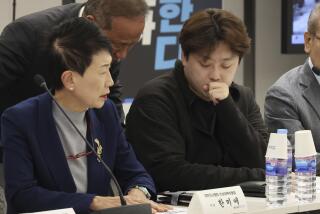U.S. Officially Bans Arms Sales to Venezuela
The U.S. government officially banned all arms sales to Venezuela, accusing the government of President Hugo Chavez of not cooperating with Washington’s anti-terrorism efforts.
The weapons ban formalizes what has been a de facto policy as U.S.-Venezuelan relations deteriorated in recent months.
In November, the U.S. government acknowledged that it had moved to block sales of eight Spanish patrol boats and 12 aircraft to Venezuela, saying the equipment contained American technology.
Venezuela said the boats and planes were to be used for non-offensive purposes, including combating drug traffic. Spain and Venezuela signed a deal anyway, replacing the gear in question with European components.
This year, the Bush administration quashed the sale of four Brazilian jets to Venezuela, citing U.S. components in the aircraft. Venezuela promptly announced that it would buy planes from Russia instead.
Venezuela recently bought 100,000 assault rifles from Moscow and is considering “buying other types of arms from other friendly countries,” Foreign Minister Ali Rodriguez said Monday.
The Pentagon has also refused to sell spare parts for a fleet of F-16 jet fighter aircraft that Venezuela purchased in the 1980s.
“They have earned their spot honestly,” State Department spokesman Sean McCormack said about Venezuela on Monday. “This focuses on concerns [over] the relationship they have built up with states like Iran and Cuba, state sponsors of terror ... which has made it very difficult for the United States to work on anti-terrorism efforts with them.”
McCormack said the U.S. government was also concerned about alleged “interactions” between Venezuela and Colombian guerrilla groups, contacts that Chavez has strenuously denied.
Visiting in London, Chavez told reporters that the measure wouldn’t affect Venezuela at all.
“We have to alert the world to the threat of empire. Today it is Venezuela, tomorrow it could be any country.... We will react like Quixote. If the dogs bark, it means we are moving forward. Let the dogs bark.”
In Caracas, Venezuela’s capital, Rodriguez said the United States “is the most terrorist nation,” citing its refusal to deport Luis Posada Carriles to face charges that while he was in Venezuela he plotted the 1976 bombing of a Cuban airliner that killed 73 people. Carriles is in U.S. custody on immigration charges.
“It is the height of cynicism,” Rodriguez said of U.S. accusations against his country.
U.S.-Venezuelan relations have been marked by increasingly ugly rhetoric. Defense Secretary Donald H. Rumsfeld likened Chavez to Adolf Hitler in February, and Chavez routinely uses insulting language when referring to President Bush.
Venezuelan demonstrators have physically harassed U.S. Ambassador William Brownfield on several occasions this year as Venezuelan police stood by.
Special correspondent Stephen Ixer in Caracas contributed to this report.
More to Read
Start your day right
Sign up for Essential California for news, features and recommendations from the L.A. Times and beyond in your inbox six days a week.
You may occasionally receive promotional content from the Los Angeles Times.






